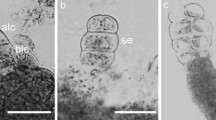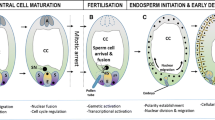Abstract
Using confocal laser scanning microscopy we have characterized early and intermediate stages of maize wild-type embryogenesis and compared to mutant development of four different embryo-specific mutations, emb*-8518, emb*-8521, emb*-8537, and emb*-8542. Confocal laser scanning microscopy is well suited to study embryo development in maize in a nondisruptive manner from shortly after fertilization to late stages in embryogenesis. The analysis of the mutant morphology indicated that two of the recessive mutations, emb*-8518 and emb*-8521,cause an early developmental arrest in the proembryo/early transition stage: mutant embryos are unable to enter the morphogenetic phase of embryogenesis. In contrast, homozygous emb*-8537, and emb*-8542 embryos progress at least to the coleoptilar stage and sometimes establish a functional shoot meristem that can determine leaf primordia. The morphological characterization of mutants was confirmed by analysis of the expression pattern of three different marker genes: Lipid transfer protein 2, Zea mays Outer Cell Layer 1, and Knotted 1. Our data indicate that both emb*-8518 and emb*-8521 mutant embryos are impaired in restriction of ZmOCL1 transcripts to the embryonic protoderm and therefore fail to establish a normal radial organization. In contrast, emb*-8537 and emb*-8542 embryos exhibit the wild-type pattern and proceed in development to the formation of a shoot apical meristem and the establishment of bilateral symmetry.
Similar content being viewed by others
Author information
Authors and Affiliations
Additional information
Received: 29 July 1999 / Accepted: 23 December 1999
Rights and permissions
About this article
Cite this article
Elster, R., Bommert, P., Sheridan, W. et al. Analysis of four embryo-specific mutants in Zea mays reveals that incomplete radial organization of the proembryo interferes with subsequent development. Dev Gene Evol 210, 300–310 (2000). https://doi.org/10.1007/PL00008189
Issue Date:
DOI: https://doi.org/10.1007/PL00008189




